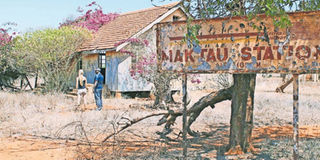The battlefields of Taita Taveta

The old railway station in Maktau, a town in Taita Taveta which in 1915 hosted more than 20,000 British troops. PHOTO | JAN FOX
What you need to know:
- Today there’s a crumbling old railway station, and a Commonwealth War Graves Commission (CWGC) memorial for several Indian soldiers killed.
Before dawn on August 15, 1914, a column of 200 soldiers of the German Schutztruppe marched into the Taveta township and exchanged fire with a British East African Police Border Detachment.
The corporal in charge of the police post, Murimi Mwiti, was killed as he resisted the German advance, becoming the first of many fatalities of the East African Campaign of the First World War.
Despite its huge impact on the social and economic fabric of East Africa, this campaign has largely been forgotten. In popular European culture, it is mainly remembered as a militarily insignificant side-show to the main events on the Western Front, and the governments of Kenya and Tanzania have had little interest in promoting remembrance of WW1 since independence in the 1960s.
It may have ultimately been a war between colonisers, but the main burden of the fighting fell on the shoulders of the colonised. The majority of the 250,000 soldiers involved in the campaign were either Africans (mainly East Africans) or Indians. Four million Africans from British East Africa, now Kenya — 25 per cent of the population at the time — also contributed in some way as the “feet and hands of the army”.
Recently, however, greater interest in the East African Campaign has been generated as we approach the centenary of the armistice of 1918. Between 23-25 November, the Tsavo Heritage Foundation is co-ordinating the First World War centenary commemorations in Taita Taveta County — where the bulk of the fighting took place. I travelled to the county last weekend to explore some of the sites on the itinerary of the commemorations.
I stayed at the Sarova Taita Hills and Salt Lick Game Lodges, which offer good value train packages, so it was an opportunity for me to take the SGR for the first time. It’s a four-hour journey from Nairobi to Voi, which I spent immersed in the pages of James G Willson’sGuerrillas of Tsavo— a very detailed account of the East African Campaign, and in particular the actions of the outnumbered Schutztruppe under the remarkable leadership of Colonel Paul von Lettow-Vorbeck.
It was useful to have a bit of context as we explored the battlefields over the course of the weekend, but our guide was excellent, too. Willie Mwandilo is the manager of both of the Sarova lodges, and is very familiar with the history of the area. He started out by giving us a presentation on the campaign, and leading us round the WW1 museum at the Taita Hills Game Lodge. He explained how the conflict was focused in the Taita Taveta area because the Germans aimed to sever key British supply lines, especially the Uganda Railway.
A couple of kilometres from the lodge is a spot along the old Voi-Maktau Railway called “Mile 27”, where a group of German saboteurs fought a British regiment.
Willie then showed us round a few British forts, including the desolate town of Maktau, which in 1915 hosted over 20,000 troops. Today there’s a crumbling old railway station, and a Commonwealth War Graves Commission (CWGC) memorial for several Indian soldiers killed.
We also visited the CWGC memorials in Voi and Taveta, and walked round the old Taveta Police Station.
We climbed Salaita Hill, too, which was a German stronghold, where we found old bullet cases, trenches and defensive walls. It’s astonishing how well preserved these sites are — albeit inadvertently — and how unaware most of us are of their significance.
So I highly recommend going along to the centenary commemorations from 23-25 November, or booking a guided battlefield safari with Sarova. For the commemorations, get in touch with the Tsavo Heritage Foundation by emailing [email protected], or calling 0736668890 or 0727668890.
Alternatively, if you would like to book an insightful battlefield safari, email [email protected], or call 0709111000.
Jan Fox is a Director at iDC





